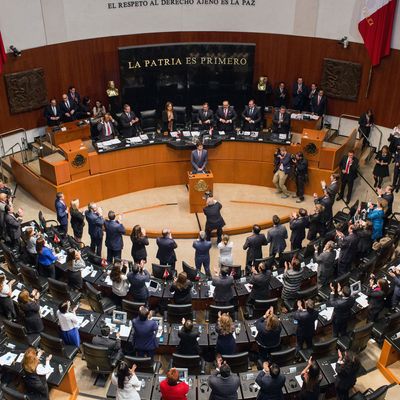
So far, corporate Republicans’ deal with the Donald has paid off, handsomely: For its complicity in the ascent of reactionary (white) nationalism, the business wing of the GOP has received a pliant federal bureaucracy, a looming neo-Lochner era in American jurisprudence, a booming stock market, and a Congress hell-bent on passing giant corporate tax cuts over the public’s overwhelming opposition.
Since taking office, Trump has stayed true to his campaign’s caustic anti-globalism when doing so would hurt vulnerable minority groups. But when adherence to right-wing nationalism would afflict the powerful, the president has generally told Steve Bannon to go cuck himself.
But this era of good feelings between Wall Street and the White House might be nearing its end.
In late September, far-right theocrat Roy Moore beat Establishment incumbent senator Luther Strange in a Republican primary in Alabama. That outcome was heavily influenced by idiosyncratic local factors, but Bannon had campaigned for Moore, while Trump had stumped for Strange. Thus, Breitbart framed the race as a proxy war between itself and the White House. The president (reportedly) bought this narrative — and proceeded to take a hard right turn.
After making a preliminary deal with Democrats to provide protection for DACA recipients, the president now demands radical cuts to legal immigration as a precondition to any amnesty. After months of signing off on the payment of Obamacare’s subsidies to insurers, and certifying Iran’s compliance with the nuclear agreement, Trump now refuses to do either.
In the absence of congressional action, these moves will trigger the largest “delegalization” of American residents in the nation’s history, skyrocketing premiums in the individual insurance market, and a severe diplomatic crisis with Tehran and our core European allies.
Which is to say: Trump appears evermore willing to defy the warnings of experts — and sow far-reaching chaos — to satisfy the far-right.
This fact should have corporate titans sweating in their c-suites as they read up on the sorry state of the NAFTA renegotiations:
The fourth round of negotiations is nearing an end amid rising tensions after the U.S. presented proposals that could be politically unfeasible for Canada and Mexico. U.S. industry and Congress, meanwhile, are mounting a more vocal defense for preserving regional trade ties as they sense the discussions could be in trouble … Nafta’s fate may now hang on how flexible the U.S. is about its demands heading into the fifth round of talks, scheduled for Mexico City around the first week of November.
… Canada’s chief negotiator, Steve Verheul, told stakeholders during an earlier negotiating session that he’d warned the U.S. [Chamber of Commerce] to brace for the possibility of life after Nafta, according to two officials familiar with the meeting.
The Trump administration’s deal-breaking demands include “a sunset clause,” which would automatically end the agreement in five years, unless all three parties agree to extend it. This may be the most bizarre of the White House’s demands, given that the American president has the power to initiate withdrawal from the agreement at any time, and the text of the deal is regularly renegotiated.
The administration’s most explosive proposal, however, may be its revisions to NAFTA’s rules of origin. Currently, cars and pickup trucks imported to the U.S. from Canada or Mexico need to be constructed from at least 62.5 percent North American–made parts. Trump would like to increase that continent-wide percentage — and specify that the autos must also be made from at least 50 percent U.S.-made inputs.
This demand is antithetical to NAFTA’s animating purpose, which was to promote duty-free trade across North America, while erecting a few light trade barriers against wares from other continents. It would also disrupt well-established supply chains, which is why most U.S. automakers actually oppose a provision ostensibly designed for their benefit. Most ironically, the change might even increase the foreign share of the American car parts market, as buyers gravitate toward suppliers in Europe and Japan.
Finally, the Trump administration is pushing to scale back the investor-state dispute settlement process, which allow tribunals of (predominately business-friendly) attorneys to arbitrate disputes between nations and corporations. In this instance, the White House has a strong case on its side. But the proposal would nonetheless represent a radical change to the status quo, one that the Mexican and Canadian governments have little interest in making.
Even if Justin Trudeau or Enrique Peña Nieto would prefer to acquiesce to America’s bullying than let the agreement fall apart, it would likely be politically untenable for them to do so. Trump is widely reviled in both countries, and has repeatedly, publicly, framed his vision for trade in zero sum terms — which is to say, he has suggested that America’s gain in NAFTA negotiations will be Mexico and Canada’s loss. Democratically elected leaders do not, typically, champion plans to disadvantage their own citizens at the behest of an unpopular foreign leader.
All signs suggest Mexico and Canada aren’t playing ball. Which means, for NAFTA to be salvaged, Trump will need to back down. But the president will also have the option of giving six-months notice of his intention to withdraw from a deal. And recently, he’s displayed a marked fondness for such long-fused time bombs.
Mexico insists that it will not negotiate during that six-month window. Members of Congress and business groups are already putting together political and legal strategies for salvaging the deal during that countdown period. But even if the agreement is ultimately saved, the U.S. announcing its intention to withdraw could hammer markets — and cause some Wall Street plutocrats to fear that seeking power by riding the back of a tiger might come with downsides.






























